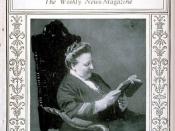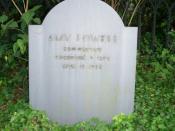QUESTION: Texts often represent women as victims in a patriarchal society. How are women represented in two of the poems set for study?During the late 20th Century women remained constrained by gender ideals which they were expected to conform to; subservience, piety and beauty. This domineering state of inferiority experienced by these women is expressed and challenged by both Mary Elizabeth Coleridge and Amy Lowell through their exploration of the victimisation of women in a patriarchal society.. The underlying desire for freedom, which the poets Coleridge and Lowell illustrate in their respective poems The Other Side of the Mirror and Patterns, brings awareness to the repressive and harsh environment women have previously been brought up in.
The ideal of femininity, imposed by the patriarchy, particularly highlights the importance of the physical beauty of women. To men, women have been identified as a prized possession, acknowledged merely for their physical attributes, suggesting the dehumanisation of women and how their female experiences become trivial.
Coleridge's The Other Side of the Mirror, exemplifies this in 'a face bereft of loveliness' which stresses the essential aspect of beauty through the positive connotations of 'loveliness'. This same face is then suggested as one that 'no man on earth could guess', further emphasising how, without beauty, women are discarded from the thoughts of men. Similarly, Lowell highlights the importance and expectations of feminine beauty through the representation of the 'fine brocaded gown' which places both a physical and symbolic restriction on the persona in Patterns. The movement of the natural environment, 'blowing' and 'flutter[ing] in the breeze', juxtaposes with the constraint of the 'stiff brocaded gown' which depicts the idealised hourglass physique of a woman, despite the apparent difficulty in breathing and inability to walk comfortably. The use of the plosive sound 'k' in...


